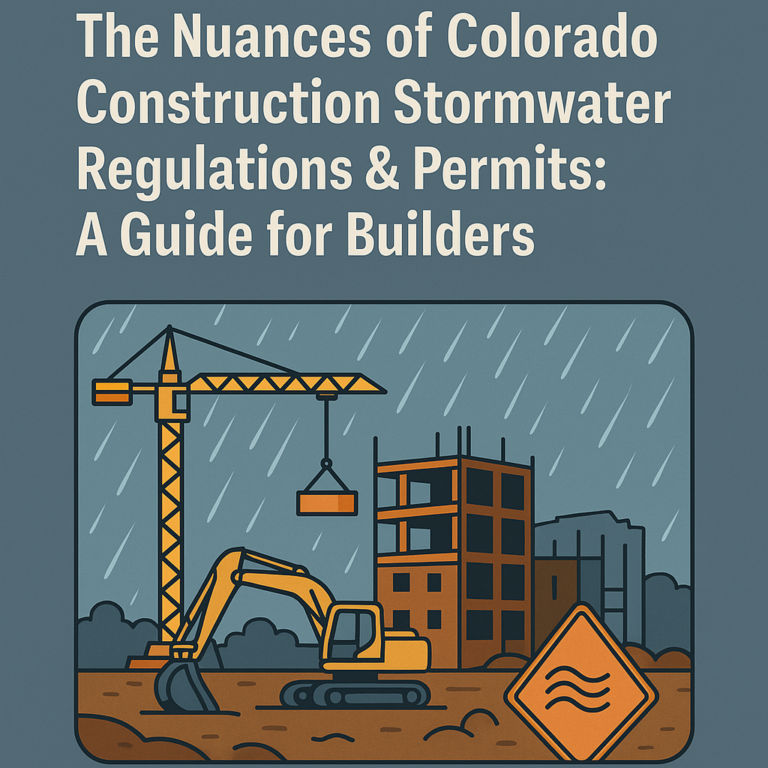Construction Companies Biweekly Inspections as Required in Colorado During Construction
As construction companies begin new projects in Colorado, they must be aware of construction stormwater inspection requirements unique to CO compared to other states and regions. A large sector of the regulatory framework involves construction stormwater regulations. Read on to learn more about Colorado stormwater regulations and permits, including what permits are required and the importance of construction stormwater regulations management in Colorado.

Understanding Colorado Construction Stormwater Permits
Do I Need a Stormwater Permit in Colorado?
If you are involved in any type of construction project in Colorado, then the answer is most likely yes. Under Colorado’s construction stormwater requirements, any construction site that disturbs more than one acre of land must obtain a CO construction stormwater permit. The permit ensures that your construction project does not cause construction runoff, which can infiltrate and pollute local waterways.
What Is an MS4 Permit in Colorado?
Under Colorado stormwater regulations, if your construction site is located within an MS4 jurisdiction, you have additional requirements to follow that adhere to best management practices (BMPs) when it comes to stormwater. MS4 permits are issued to local municipalities in CO and are meant to regulate the discharge of stormwater. For example, you may be asked to add stormwater pond construction, detention pond construction or other BMPs.
Construction and Stormwater Management
What is Stormwater Management in Construction?
Stormwater management in construction refers to the implementation of practices to prevent industrial runoff from stormwater infiltrating nearby waterways and local water supplies. BMPs aid in reducing the flow and/or improving the quality of the runoff, depending on what is needed on a construction stormwater permit.
Effective stormwater management is crucial as construction can disturb the soil, increasing sedimentation and erosion risk. Underground detention systems, erosion control, ponds and basins can all help to control runoff.
What Is Never an Allowable Stormwater Discharge from a Construction Site?
It is important to understand Colorado stormwater regulations when it comes to discharge. For example, pollutants, such as sediment, oil, grease and chemicals, are forbidden from leaving the construction site. Erosion control measures are a required BMP to stop sediment laden water from discharging into the stormwater conveyances. Complete compliance is required to go forward with a construction project.
The Importance of Inspections
Construction Stormwater Site Inspections
Colorado stormwater regulations require bi-weekly inspections in order to maintain compliance as well as an inspection after significant rain events (an event large enough to cause erosion). This is to assess the effectiveness of the BMPs that were put in place. In order to keep a construction stormwater general permit in CO, construction sites must adhere to and comply with these inspections. Inspections are in place to identify significant problems before they arise. During the inspection, the following will be evaluated:
- Condition of erosion control measures
- Functionality of stormwater drainage systems
- Overall management of construction runoff
Ensuring these inspections are completed by a qualified stormwater manager will ensure the construction company avoids fines and violations in the event that a significant stormwater problem develops.
The Journey of Stormwater
Where Does Stormwater Travel After It Leaves a Construction Site?
Construction stormwater regulations management in Denver, CO and surrounding areas is stringent due to the damage stormwater can do if not properly managed. Once stormwater leaves a site, it typically flows into storm drains or drainage systems. If BMPs are not in place, pollutants will build up within the discharge and into those systems.
What is a storm drain in construction? A drain is designed to collect and convey stormwater runoff from construction sites. Storm drains are often connected to a larger drainage system that can lead to detention ponds, rivers, or lakes. Understanding stormwater drainage construction and construction site stormwater runoff control are vital to ensure that BMPs are effective.
Implementing Effective Stormwater Management Practices
Stormwater Pond Construction and Detention Pond Construction
Two effective ways to help manage runoff, both for Colorado stormwater regulations and in other areas, are stormwater ponds and detention pond construction. Stormwater ponds store temporary runoff, allowing sediment to settle and pollutants to be filtered before water is released back into the environment. Detention ponds are different in that they are designed to hold water for a short time to help prevent flooding and reduce peak flow rates. Another effective method is an underground detention system, which holds runoff underground.
Understanding Colorado’s stormwater regulations and permit requirements is essential for any construction company looking to build in the state. Knowledge of BMPs and how to implement them is imperative to ensure compliance.






















































